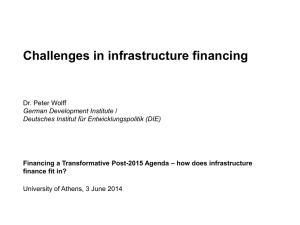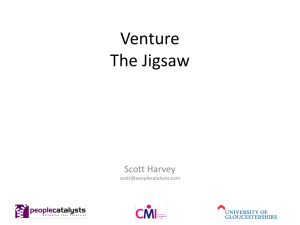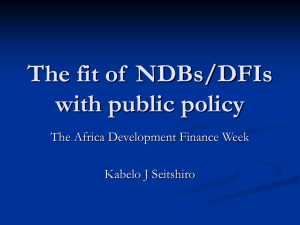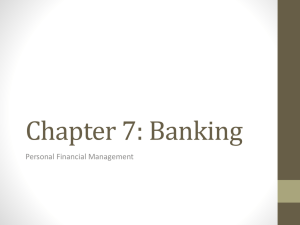PRUDENTIAL REGULATIONS FOR CONSUMER FINANCING
advertisement
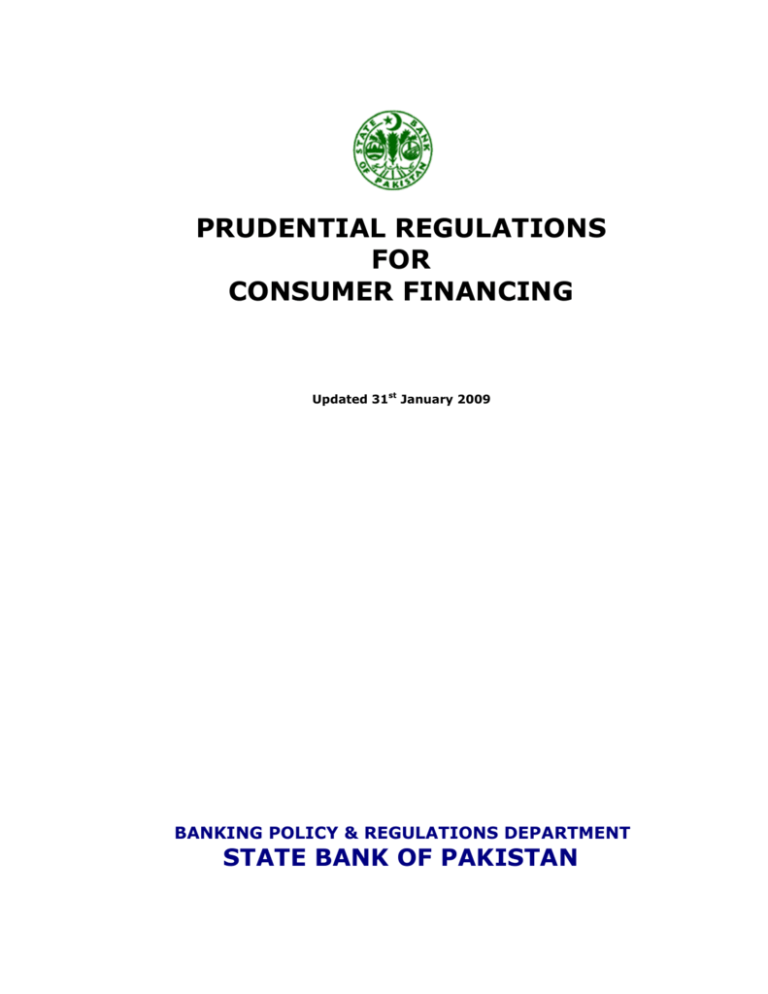
PRUDENTIAL REGULATIONS FOR CONSUMER FINANCING Updated 31st January 2009 BANKING POLICY & REGULATIONS DEPARTMENT STATE BANK OF PAKISTAN REGULATIONS FOR HOUSING FINANCE REGULATION R-15 Banks / DFIs shall determine the housing finance limit, both in urban and rural areas, in accordance with their internal credit policy, credit worthiness and loan repayment capacity of the borrowers. At the same time, while determining the credit worthiness and repayment capacity of the prospective borrower, banks / DFIs shall ensure that the total monthly amortization payments of consumer loans, inclusive of housing loan, should not exceed 50% of the net disposable income of the prospective borrower. Banks / DFIs will not allow housing finance purely for the purchase of land / plots; rather, such financing would be extended for the purchase of land / plot and construction on it. Accordingly, the sanctioned loan limit, assessed on the basis of repayment capacity of the borrower, value of land / plot and cost of construction on it etc., should be disbursed in tranches, i.e. up to a maximum of 50% of the loan limit can be disbursed for the purchase of land/ plot, and the remaining amount be disbursed for construction there-upon. Further, the lending bank / DFI will take a realistic construction schedule from the borrower before allowing disbursement of the initial loan limit for the purchase of land / plot. Banks / DFIs may allow housing finance facility for construction of houses against the security of land / plot already owned by their customers. However, the lending bank / DFI will ensure that the loan amount is utilized strictly for the construction purpose and loan is disbursed in tranches as per construction schedule. Loans against the security of existing land / plot, or for the purchase of new piece of land / plot, for commercial and industrial purposes may be allowed. But such loans will be treated as Commercial Loans, which will be covered either under Prudential Regulations for Corporate / Commercial Banking or Prudential Regulations for SMEs Financing. Banks / DFIs may allow Housing Loans in the rural areas provided all relevant guidelines/regulations on the subject are complied with by them. REGULATION R-16 The housing finance facility shall be provided at a maximum debt-equity ratio of 85:15. REGULATION R-17 Banks / DFIs are free to extend mortgage loans for housing, for a period not exceeding twenty years. Banks / DFIs should be mindful of adequate asset liability matching. REGULATION R-18 The house financed by the bank / DFI shall be mortgaged in bank’s / DFI’s favour by way of equitable or registered mortgage. REGULATION R-19 Banks / DFIs shall either engage professional expertise or arrange sufficient training for their concerned officials to evaluate the property, assess the genuineness and integrity of the title documents, etc. It may, however, be noted that the requirement of full-scope and desk-top evaluation, as required under R-8 and R-11 of Prudential Regulations for Corporate / Commercial Banking and SMEs Financing respectively, will not be applicable on housing finance. 15 REGULATION R-20 The bank’s / DFI’s management should put in place a mechanism to monitor conditions in the real estate market (or other product market) at least on quarterly basis to ensure that its policies are aligned to current market conditions. REGULATION R-21 Banks / DFIs are encouraged to develop floating rate products for extending housing finance, thereby managing interest rate risk to avoid its adverse effects. Banks / DFIs are also encouraged to develop in-house system to stress test their housing portfolio against adverse movements in interest rates as also maturity mismatches. REGULATION R-22 The mortgage loans shall be classified and provided for in the following manner: CLASSIFICATION DETERMINANT (1) (2) TREATMENT OF INCOME (3) PROVISIONS TO BE MADE* (4) 1. Substandard. Where markup/ interest or principal is overdue by 90 days or more from the due date. Unrealized markup/interest to be kept in Memorandum Account and not to be credited to Income Account except when realized in cash. Unrealized mark up/interest already taken to income account to be reversed and kept in Memorandum Account. Provision of 25% of the difference resulting from the outstanding balance of principal less the amount of liquid assets realizable without recourse to a Court of Law and Forced Sale Value (FSV) of mortgaged properties to the extent of 50% of such FSV. 2. Doubtful. Where markup/ interest or principal is overdue by 180 days or more from the due date. As above. Provision of 50% of the difference resulting from the outstanding balance of principal less the amount of liquid assets realizable without recourse to a Court of Law and Forced Sale Value (FSV) of mortgaged properties to the extent of 50% of such FSV. 16
